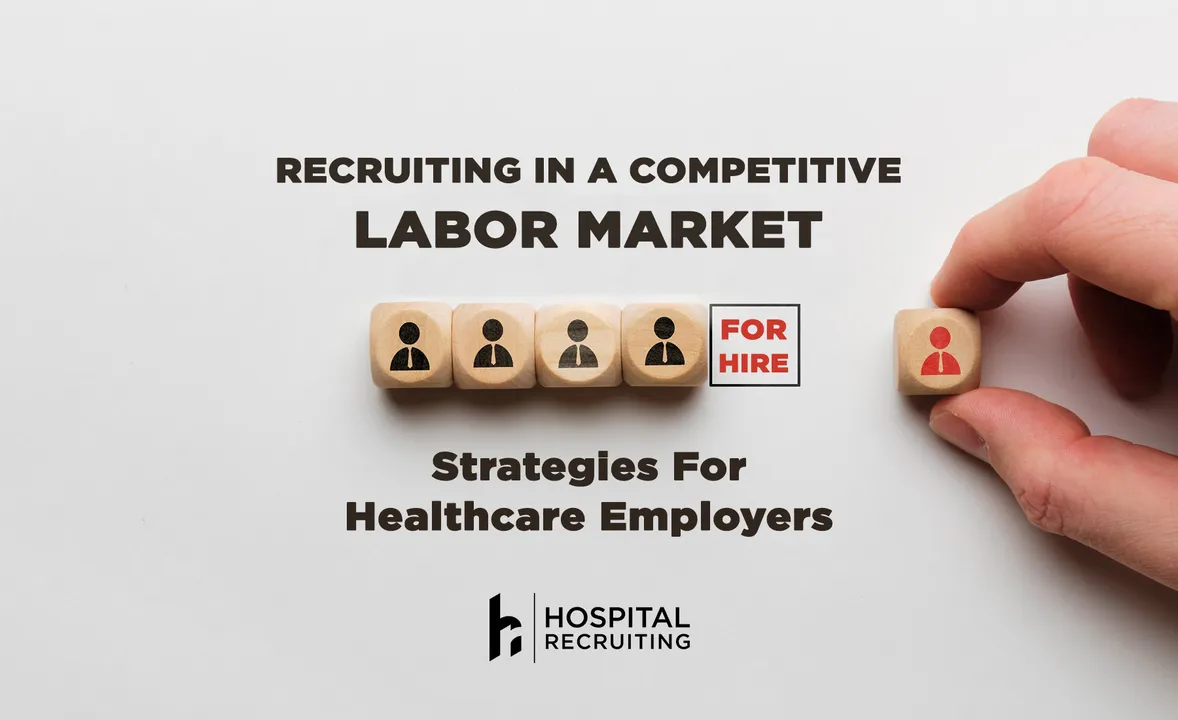Recruiting in a Competitive Labor Market: Strategies for Healthcare Employers

In today’s rapidly evolving healthcare landscape, employers navigate a critical crossroads. As the demand for healthcare services intensifies, the labor market has tightened considerably, underscoring the requirement for effective recruitment and retention strategies. As we delve deeper into this challenge, it becomes increasingly clear that understanding the unique characteristics of the healthcare profession forms the foundation of any successful employment strategy.
Understanding Healthcare Professionals’ Needs
It’s a well-acknowledged fact that healthcare professionals stand apart due to their specialized training and the high-pressure environment in which they function. Their needs, therefore, are markedly different from those in many other sectors. These needs are not just about the tangible aspects of employment but also relate deeply to personal growth, job satisfaction, and work-life harmony.
Continuous Learning: The dynamic nature of medicine and healthcare requires professionals to be lifelong learners. By offering avenues like workshops, seminars, and certifications, employers signal their commitment to professional enrichment.
Work-life Balance: The erratic hours and the emotional toll of healthcare roles make a balanced personal and professional life all the more critical. Structured schedules, regular breaks, and time-off policies can provide the respite these professionals often seek.
Strengthening the Employer Brand
In the information age, a strong brand presence isn’t just a luxury; it’s a necessity. Healthcare professionals today are savvy consumers of information, researching potential employers thoroughly before making career moves. Hence, healthcare providers must shape and protect their image in the marketplace.
Feedback Mechanisms: Active engagement with staff to solicit feedback can provide real-time insights, offering an opportunity to tweak practices and policies for the better.
Positive PR: Being in the public eye for the right reasons, like community health initiatives, can cement an employer's position as a leader in healthcare and societal well-being.
Community Outreach: Direct engagements with the community underline an organization's values, making it more relatable and attractive to potential employees.
Technological Integration
As the world pivots towards an increasingly digital future, healthcare isn't far behind. Leveraging technology isn't just about staying current; it's about enhancing efficiency, widening reach, and providing convenience for healthcare professionals and recruiters.
Mobile Recruitment: The prominence of smartphones means job seekers often start their searches on mobile devices. An optimized platform can make the process seamless.
Video Interviews: An innovative solution to overcome geographical barriers and scheduling in-person interviews, video interviews can offer a comprehensive assessment tool, especially crucial in the current telehealth era.
Crafting Competitive Compensation
While financial compensation remains a significant factor in employment decisions, today’s healthcare professionals look at a more holistic total rewards package that aligns with their personal and professional aspirations.
Non-monetary Benefits: Perks such as childcare, wellness memberships, and mental health support can significantly enhance the overall value proposition, sometimes even more than the paycheck itself.
Transparent Growth Paths: A well-defined roadmap detailing career progression, accompanying benefits, and professional milestones can significantly attract those seeking long-term roles.
Employee Retention Strategies
Recruitment might get professionals through the door, but retention keeps them there. In the high-stress world of healthcare, feeling valued, heard, and supported can make all the difference.
Regular Check-ins: Continuous dialogue fosters a sense of belonging, allowing potential concerns to be addressed before they escalate.
Team Building: Cultivating a sense of camaraderie and mutual respect can go a long way in building a cohesive, committed team.
Engaging with Educational Institutions
The future of healthcare is shaped in educational institutions, where eager students immerse themselves in the intricacies of the field. Forming relationships with these learning hubs isn't just about immediate recruitment needs; it's a forward-thinking strategy that ensures a continuous influx of passionate professionals.
Guest Lectures and Engagements: Through seasoned professionals from the organization, direct interaction with students can serve as both an educational endeavor for students and a talent-spotting opportunity for employers.
Job Fairs: These events are not just about setting up a booth; they're about conversations, showcasing organizational culture, and gauging the potential fit of budding professionals in real time.
Flexibility in Working Options
The concept of work has evolved tremendously, especially with technological advancements facilitating more flexible arrangements. Embracing this change isn't just about catering to professionals' preferences; it's about harnessing talent, regardless of geographical constraints.
Remote Roles: While hands-on clinical tasks require a physical presence, many administrative and support roles can be performed remotely, thus expanding the potential talent pool.
Alternative Shifts: Customized shifts, like condensed workweeks or varied hours, cater to professionals' unique needs, potentially improving job satisfaction and efficiency.
Broadening the Recruitment Horizon
In the quest for the perfect candidate, it's easy to get tunnel vision, focusing solely on traditional avenues or fixed criteria. However, the dynamic world of healthcare requires a broader perspective that recognizes potential in unconventional places.
Skills Over Titles: While a title might give a snapshot of a person's professional journey, the underlying skills, adaptability, and growth potential often paint a more comprehensive picture.
Rehiring: Past employees, provided they left on good terms, bring a unique advantage – they understand the organizational culture, reducing the onboarding time and ensuring a smoother transition.
Streamlining Recruitment
Recruitment efficiency isn't just about speeding up the process; it's about respect, clarity, and creating a positive experience for every candidate, irrespective of the outcome.
Job Clarity: Precise descriptions, clear expectations, and transparency in requirements ensure that both the employer and the potential employee are on the same page from the outset.
Feedback Loops: A simple gesture, like offering constructive feedback, can have profound effects. It can turn a rejection into a learning opportunity, laying the groundwork for future engagements.
Championing Diversity and Inclusion
In an interconnected global world, diversity is not just a buzzword—it's an essential pillar of a thriving workplace. By fostering diversity, organizations enrich their workforce; they enhance their capacity for empathy, innovation, and holistic patient care.
Cultural Training: Regular workshops to understand, respect, and celebrate cultural differences can bridge potential divides, making the workplace genuinely inclusive.
Inclusive Policies: Practical measures, like facilities for differently-abled employees or flexibility for religious observances, underline an organization's commitment to its diverse workforce.
Conclusion
Employers must lead with strategy in the complex world of healthcare recruitment, especially in a tough labor market. Recognizing that their greatest assets are their professionals, healthcare organizations must craft a multifaceted approach that marries the practicalities of recruitment with the human-centric essence of healthcare. As they navigate this challenging terrain, it's imperative to remember that every investment in talent is an investment in the future of healthcare, a future where quality, compassion, and innovation reign supreme.
**Editor's Note: Job boards are a great way to bolster your recruitment and candidate sourcing efforts. For more exposure, consider publishing your healthcare jobs on HospitalRecruiting**
Related Posts
